

Why Lonely People Stay Lonely. The Morning Guy - StumbleUpon. Go-figure-alzheimers-120306. 11 New Warning Signs Help Spot Mental Illness in Children. To help children with undiagnosed mental disorders, researchers today (Oct. 28) issued a list of 11 easy-to-recognize warning signs for use by parents and others in the community.
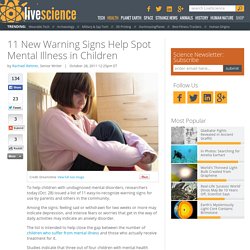
Among the signs: feeling sad or withdrawn for two weeks or more may indicate depression, and intense fears or worries that get in the way of daily activities may indicate an anxiety disorder. The list is intended to help close the gap between the number of children who suffer from mental illness and those who actually receive treatment for it. Studies indicate that three out of four children with mental health disorders, including attention-deficit/hyperactivity disorder (ADHD ), eating disorders and bipolar disorder, go unrecognized and do not receive the care they need, the researchers say. Parents who notice any of the signs in their child should take him or her to see a pediatrician or mental health professional for a psychiatric evaluation, the researchers said.
The 11 warnings signs are as follows: What Schizophrenia Can Teach Us About Ourselves — NOVA Next. “I don’t believe in anything.
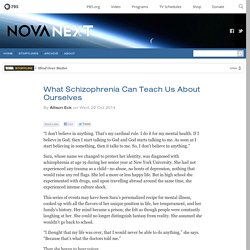
That’s my cardinal rule. I do it for my mental health. If I believe in God, then I start talking to God and God starts talking to me. As soon as I start believing in something, then it talks to me. Schizophrenia. Definition Schizophrenia is a chronic and severe mental disorder that affects how a person thinks, feels, and behaves.

People with schizophrenia may seem like they have lost touch with reality. Striking gender differences in emoticon usage... Q & A: Why kids kill parents. Kathleen M.

Heide, PhD is professor of criminology at the University of South Florida, Tampa. She has published two widely acclaimed books on juvenile homicide, "Why Kids Kill Parents: Child Abuse and Adolescent Homicide" and "Young Killers: The Challenge of Juvenile Homicide," and a third, coauthored with Linda Merz-Perez, on "Animal Cruelty: Pathway to Violence Against People. " Her latest book, "Understanding Parricide: When Sons and Daughters Kill Parents" will be published by Oxford University Press in November 2012. She is a licensed mental health counselor and a court-appointed expert in matters relating to homicide, and children and families. She is a frequent consultant to the national print and electronic media and numerous international newspapers and magazines.
Beyond Happiness: The Upside of Feeling Down. No one questions the value of feeling good.
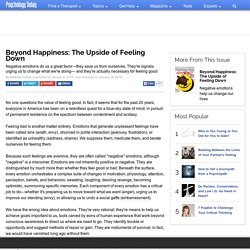
In fact, it seems that for the past 20 years, everyone in America has been on a relentless quest for a blue-sky state of mind, in pursuit of permanent residence on the spectrum between contentment and ecstasy. Feeling bad is another matter entirely. Losing Tim. Paul Gionfriddo helped create America's mental health system.
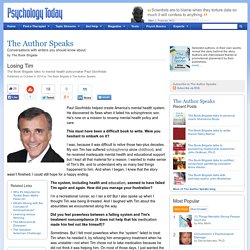
He discovered its flaws when it failed his schizophrenic son. He's now on a mission to revamp mental health policy and care. A Schizophrenia Mystery Solved? One of the enduring mysteries in schizophrenia research circles has been the disparity in outcomes between schizophrenia patients in "developing countries" and those in "developed" countries.
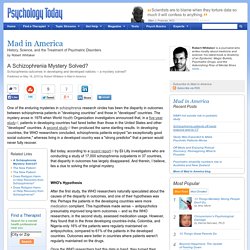
The mystery arose in 1979 when World Health Organization investigators announced that, in a five-year study, patients in developing countries had fared better than those in the United States and other "developed" countries. A second study then produced the same startling results. In developing countries, the WHO researchers concluded, schizophrenia patients enjoyed "an exceptionally good social outcome," whereas living in a developed country was a "strong predictor" that a person would never fully recover. But today, according to a recent report by Eli Lilly investigators who are conducting a study of 17,000 schizophrenia outpatients in 37 countries, that disparity in outcomes has largely disappeared.
And therein, I believe, lies a clue to solving the original mystery. 5 Hours of Sleep or Less Can Lead to False Memories. As time goes on, we are finding more evidence to support the importance of sleep to our physical and mental health.
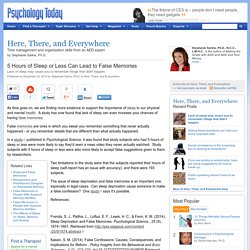
A study has now found that lack of sleep can even increase your chances of having false memories. False memories are ones in which you swear you remember something that never actually happened - or you remember details that are different than what actually happened. In a study published in Psychological Science, it was found that study subjects who had 5 hours of sleep or less were more likely to say they'd seen a news video they never actually watched. Study subjects with 5 hours of sleep or less were also more likely to accept false suggestions given to them by researchers. Everyday Sociopathy: Is Your Friend Passive-Exploitive? George Bernard Shaw famously said, “Patriotism is your conviction that this country is superior to all others because you were born in it.”
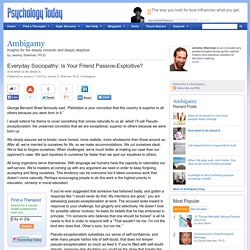
I would extend his theme to cover something that comes naturally to us all, which I’ll call Pseudo-exceptionalism: the unearned conviction that we are exceptional, superior to others because we were born us. We simply assume we’re kinder, more honest, more realistic, more wholesome than those around us. After all, we’re married to ourselves for life, so we make accommodations. Why Time Goes Faster as You Get Older. Have you ever wondered why life seems to pass more quickly as you get older?
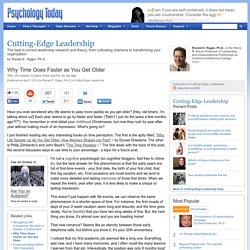
[Hey, old-timers, I'm talking about us!] Each year seems to go by faster and faster ("Didn't I just do the taxes a few months ago?!? "). You remember in vivid detail your childhood Christmases, but now they rush by year after year without making much of an impression. What's going on? Good Old Days Syndrome. As many of you know, my life changed dramatically in 2001 when I became chronically ill and eventually had to give up a career that I loved. Although I've adjusted to my new life, I can still find myself romanticizing the past. I call it Good Old Days Syndrome. When it attacks, I convince myself that before I got sick, my life was perfect: working at the law school was always fulfilling; my family life was everything I could wish for; I was free to go wherever I wanted, whenever I wanted.
Was all of this true? No!